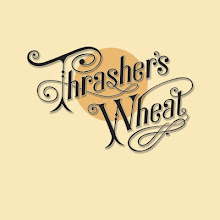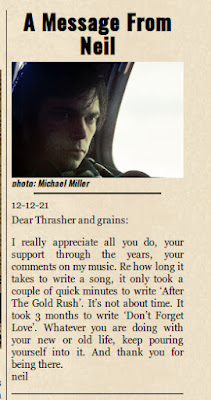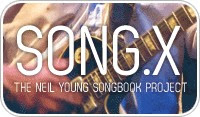TRANSCRIPT: Bob Dylan's Comments at MusiCares 2015
Bob Dylan, Jimmy Carter, Neil Portnow
From transcript of Bob Dylan's comments at MusiCares 2015:
These songs didn't come out of thin air. I didn't just make them up out of whole cloth. Contrary to what Lou Levy said, there was a precedent. It all came out of traditional music: traditional folk music, traditional rock 'n' roll and traditional big band swing orchestra music.Also, Dylan thanked musicians who influenced him:
I learned lyrics and how to write them from listening to folk songs. And I played them, and I met other people that played them, back when nobody was doing it. Sang nothing but these folk songs, and they gave me the code for everything that's fair game, that everything belongs to everyone. For three or four years all I listened to were folk standards. I went to sleep singing folk songs. I sang them everywhere, clubs, parties, bars, coffeehouses, fields, festivals. And I met other singers along the way who did the same thing and we just learned songs from each other. I could learn one song and sing it next in an hour if I'd heard it just once.
If you sang "John Henry" as many times as me --
"John Henry was a steel-‐driving man / Died with a hammer in his hand / John Henry said a man ain't nothin' but a man / Before I let that steam drill drive me down / I'll die with that hammer in my hand."
If you had sung that song as many times as I did, you'd have written "How many roads must a man walk down?" too.
...
All these songs are connected. Don't be fooled. I just opened up a different door in a different kind of way. It's just different, saying the same thing. I didn't think it was anything out of the ordinary. Well you know, I just thought I was doing something natural, but right from the start, my songs were divisive for some reason. They divided people. I never knew why. Some got angered, others loved them. Didn't know why my songs had detractors and supporters. A strange environment to have to throw your songs into, but I did it anyway.
Last thing I thought of was who cared about what song I was writing. I was just writing them. I didn't think I was doing anything different. I thought I was just extending the line. Maybe a little bit unruly, but I was just elaborating on situations. Maybe hard to pin down, but so what? A lot of people are hard to pin down and you’ve just got to bear it.
In a sense everything evened itself out.
1. PETER, PAUL AND MARYFull transcript of Bob Dylan's comments at MusiCares 2015.
“I didn’t usually think of myself as writing songs for others to sing, but it was starting to happen. And it couldn’t have happened with a better group. They took a song of mine that I’d recorded before that was buried on one of my early records (Blowin’ in the Wind), and they turned it into a hit song. Not the way I would have done it — they straightened it out. But since then hundreds of people have recorded it. I don’t think that would have happened if it wasn’t for them. They definitely started something for me.”
2-4. THE BYRDS, THE TURTLES, SONNY AND CHER
“They made some of my songs top-10 hits. But I wasn’t a pop songwriter. I never even wanted to be that. But it was good that it happened. Their versions of songs were like commercials. I didn’t really mind that. Because 50 years later my songs would be used for commercials. So that was good, too. I was glad it happened.”
5. PERVIS STAPLES AND THE STAPLE SINGERS
“Before they were on Stax, they were on Epic. They were one of my favorite groups of all time. I met them all in ’62 or ’63. They heard my songs live. Pervis wanted to record three or four of them, and he did, with the Staple Singers. They were the type of artists I wanted recording my songs.”
6. NINA SIMONE
“I used to cross paths with her in New York City at the Village Gate nightclub. These were the artists I looked up to. She recorded some of my songs that she learned directly from me. She was an overwhelming artist. Piano player and singer. Very strong woman, very outspoken and dynamite to see perform. That she was recording my songs validated for me everything I was about.”
7. JIMI HENDRIX
“We can’t forget Jimi Hendrix. I actually saw Jimi perform when he was with a band called Jimmy James and the Blue Flames. Something like that. And Jimi didn’t even sing. He was just the guitar player. He took some small songs of mine that nobody paid any attention to and brought them up into the outer limits of the stratosphere. Turned them all into classics. I have to thank Jimi, too. I wish he was here.”
8. JOHNNY CASH
“Johnny Cash recorded some of my songs early on, too. I met him about ’63, when he was all skin and bones. He traveled long, he traveled hard, but he was a hero of mine. I heard many of his songs growing up. I knew them better than I knew my own. Big River, I Walk the Line. ‘How high’s the water, mama?’ I wrote It’s Alright Ma (I’m Only Bleeding) with that song reverberating inside my head. I still ask, ‘How high’s the water, mama?’
“Johnny was an intense character, and he saw that people were putting me down. Playing electric music. And he posted letters to magazines, scolding people, telling them to shut up and let him sing. In Johnny Cash’s world of hardcore Southern drama, that kind of thing didn’t exist. Nobody told anybody what to sing or what not to sing. Critics didn’t do that kind of thing.
“I’ve always got to thank him for doing that. Johnny Cash was a giant of a man. The Man in Black. And I’ll always cherish the friendship we had until the day there is no more days.”
9. JOAN BAEZ
“Oh, I’d be remiss if I didn’t mention Joan Baez. She was the queen of folk music then and now. She took a liking to my songs and brought me with her to play concerts where she had crowds of thousands of people enthralled with her beauty and voice. People say, ‘What are you doing with that ragtag, scrubby looking waif?’ And she’d tell the audience in no uncertain terms, ‘Now, you’d better be quiet and listen to your songs.’ We even played a few of them together.
“Joan Baez is a tough-minded as they come. … A free, independent spirit. Nobody can tell her what to do if she doesn’t want to do it. I learned a lot of things from her. A woman of devastating honesty. For her kind of love and devotion, I could never repay that back.”
Labels: bob dylan































 Human Highway
Human Highway

















 Concert Review of the Moment
Concert Review of the Moment





 This Land is My Land
This Land is My Land

 FREEDOM In A New Year
FREEDOM In A New Year









 *Thanks Neil!*
*Thanks Neil!*




![[EFC Blue Ribbon - Free Speech Online]](http://www.thrasherswheat.org/gifs/free-speech.gif)











 The Unbearable Lightness of Being Neil Young
The Unbearable Lightness of Being Neil Young Pardon My Heart
Pardon My Heart



 "We're The Ones
"We're The Ones  Thanks for Supporting Thrasher's Wheat!
Thanks for Supporting Thrasher's Wheat!




 This blog
This blog 
 (... he didn't kill himself either...)
#AaronDidntKillHimself
(... he didn't kill himself either...)
#AaronDidntKillHimself









































































 Neil Young's Moon Songs
Neil Young's Moon Songs




 Civic Duty Is Not Terrorism
Civic Duty Is Not Terrorism Orwell (and Grandpa) Was Right
Orwell (and Grandpa) Was Right


 What's So Funny About
What's So Funny About 



6 Comments:
A thrilling read. He progressively, with good humour, gets into the nitty gritty of it all.
Absolutely NAILED IT. My favorite part: "Very few rock 'n' roll bands today play with rhythm. They don't know what it is. Rock 'n' roll is a combination of blues, and it's a strange thing made up of two parts. A lot of people don't know this, but the blues, which is an American music, is not what you think it is. It's a combination of Arabic violins and Strauss waltzes working it out. But it's true. The other half of rock 'n' roll has got to be hillbilly. And that's a derogatory term, but it ought not to be. That's a term that includes the Delmore Bros., Stanley Bros., Roscoe Holcomb, Git Tanner and the Skillet Lickers... groups like that. Moonshine gone berserk. Fast cars on dirt roads. That's the kind of combination that makes up rock 'n' roll, and it can't be cooked up in a science laboratory or a studio."
nobody but Bobby could have written that
nobody but Bobby could have written that
Rolling Stone has a sort of Q&A with itself regarding Bob's epic grammy speech, its a decent read:
http://www.rollingstone.com/music/features/why-does-bob-dylan-hate-merle-haggard-a-musicares-speech-explainer-20150210?page=4
No disrespect meant to you Dan1 but man fuckin Rolling Stone. they are the exact critics that Dylan was talking about in his speech. They think that they are the gatekeepers
Post a Comment
<< Home